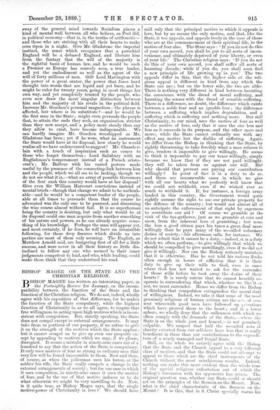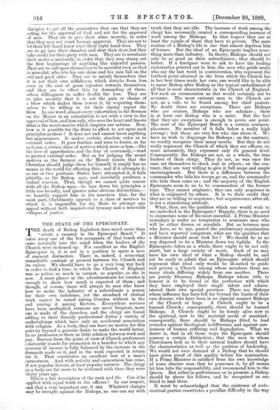BISHOP MAGEE ON THE STATE AND THE CHRISTIAN RELIGION. B ISHOP
MAGEE has written an interesting paper, in the Fortnighily Review for January, on the incom- patibility between the function of the State and the function of the Christian religion. We do not, indeed, wholly agree with his exposition of that difference, for he makes the function of the State compulsory, while the highest function of Christianity is, as we all agree, to inspire that free willingness in acting upon high motives which is incon- sistent with compulsion. But, strictly speaking, the State does not compel except to external arrangements. It may take from us portions of our property, if we refuse to give it on the strength of the motives which the State applies ; but it cannot compel us to give up even our property ex- cept by appealing to motives which we may, if we please, disregard. It seems a mistake in ninety-nine cases out of a hundred to say that the action of the State is compulsory. It only uses motives of fear so strong in ordinary men that very few will be found inaccessible to them. Now and then, of course, as when the policeman uses his baton, or the soldier his rifle, the State really compels a change in the external arrangements of society ; but for one case in which it uses compulsion, in ninety-nine cases it uses the motive of fear, and by the use of that motive induces us to do what otherwise we might be very unwilling to do. Now, is it quite true, as Bishop Magee says, that the single motive-power of Christianity is love ? We should have said only that the principal motive to which it appeals is love, but by no means the only motive, and that, like the State, it too appeals, and appeals freely in the case of those who are at the commencement of their spiritual life, to the motive of fear also. The State says : If you do not do this of your own accord, you shall be put to all sorts of incon- venience, and ultimately deprived of your liberty, or even of your life.' The Christian religion says : If you do not do this of your own accord, you shall suffer all sorts of haunting dreads ; while if you do, you shall soon find a new principle of life growing up in you.' The two appeals differ in this, that the higher side of the reli- gious appeal is different in kind from any which the State can use ; but on the lower side, the two are alike. There is nothing very different in kind between haunting the conscience with the dread of moral suffering, and haunting the senses with the dread of sensible suffering. There is a difference, no doubt, the difference which exists between a noble fear and an ignoble fear ; the difference between a suffering which implies degradation, and a suffering which is suffering and nothing more. But still Christianity, to our mind, uses the motive of fear as well as the motive of love, only that it uses the one less and less as it succeeds in its purpose, and the other more and more ; while the State cannot ordinarily use with any effect any motive but the dislike of suffering. Again, we differ from the Bishop in thinking that the State, by rightly threatening to take forcibly what a man refuses to give, renders it impossible to give willingly. He seems to think it impossible to pay our taxes willingly, simply because we know that if they are not paid willingly, they will be taken from us against our will. But why should that prevent our paying our contribution willingly ? In point of fact it is a duty to do so, and there are innumerable cases in which we give with all our hearts what we perfectly well know that we could not withhold, even if we wished ever so much to withhold it. If, for instance, a foreign army landed in this country, the Government would quite rightly assume the right to use our private property for the defence of the country ; but would not almost all of us anticipate the enforcement of that right by eagerness to contribute our aid ? Of course we grumble at the visit of the tax-gatherer, just as we grumble at rain and snow, from the inherent love of grumbling ; but none the less a good citizen pays his taxes a great deal more willingly than he pays many of the so-called voluntary duties of society,—his afternoon calls, for instance. We do not admit that it cannot be a duty,—indeed, it is a duty which we often perform,—to give willingly that which we should be compelled to give unwillingly, even if we did not give it willingly. Nor can the Bishop seriously maintain that it is otherwise. Has he not told his various flocks often enough in hours of affliction that it is their duty to give up their wills to God, even in cases where God has not waited to ask for the surrender of those wills before he took away the desire of their hearts ? It is surely untrue that we cannot heartily co- operate in surrendering that which, whether we like it or not, we must surrender. Hence we differ from the Bishop in thinking that compulsion extinguishes the moral duty of willingness. Indeed, we take it that some of the most genuinely religious of human actions are the acts of con- sent wherewith good men have followed up privations which have pierced them to the heart ; and in a lower sphere, we wholly deny that the sullenness with which we often comply with the demands of the State,—where the State is on the whole just and honest,—is not genuinely culpable. We suspect that half the so-called acts of charity extorted from our self-love have less that is really beneficent in them than our contributions to the expendi- ture of a wisely managed and frugal State. Still, on the whole we entirely agree with the Bishop that the State and the Church appeal to a very different class of motives, and that the State could not attempt to appeal to those which are the chief instruments of the Church without the most mischievous results. Indeed, nothing can make this more evident than the whole tone of the special religious exhortation out of which the Bishop's discussion with his opponents has arisen. The original question was, whether any State could or should act on the principles of the Sermon on the Mount. Now, what is the chief characteristic of the Sermon on the Mount ? It is this, that in it Christ specially warns his disciples to get all the guarantees they can that they are acting for the approval of God and not for the approval of men. They are to give their alms secretly, in order that they may not court human approval. They are not to let their left hand know what their right hand does. They are to go into their chamber and shut their door, lest they take credit for their piety with men. They are to scrutinise their motives anxiously, in order that they may stamp out the first beginnings of anything like unlawful passion. They are to call upon themselves to be merciful even as God is merciful, who lets his sun shine and his rain fall on the .evil and good alike. They are to satisfy themselves that it is not their own selfishness which shrinks from loss even in the case of gross injustice towards themselves, and they are to effect this by demanding of them- selves willingness to suffer double the loss. They are .to take security that it is not the pain or shame of -a blow which makes them resent it, by requiring them- selves to be willing to let their enemy repeat the blow. In one word, almost every exhortation in the Sermon on the Mount is an exhortation to act with a view to the approval of him, and him only, who sees the heart and knows what is the secret motive which inspires our actions. Now, how is it possible for the State to affect to act upon such principles as these ? It does not and cannot know anything but appearances. It makes certain absolute rules as to external order. It goes further, and tries to foster, as far as it can, a certain class of motives which more or less,—like the love of approbation and the fear of contumely,—tend to protect external order. But as for judging the secret motives as the Sermon on the Mount insists that the Christian should judge them for himself, it simply has no means in the world for effecting this ; and if it attempts it, as one or two puritanic States have attempted it, it fails pitiably, as the Bishop says, and inevitably produces a violent reaction. Thus, though we cannot quite concur with all the Bishop says,—he lays down his principles a little too broadly, and ignores some obvious distinctions,— we heartily support him in his assertion that, for the most part, Christianity appeals to a class of motives to which it is impossible for the State to attempt any appeal without both inquisitorial tyranny and a miserable collapse of justice.



































 Previous page
Previous page